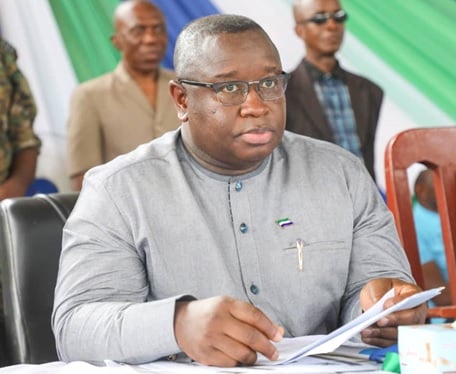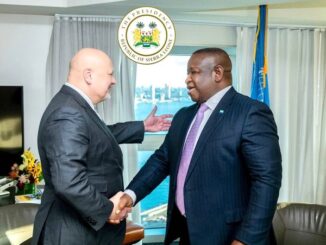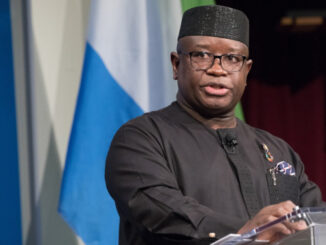
EXCERPTS FROM THE 2019 U.S STATE DEPARTMENT HUMAN RIGHTS REPORT ON SIERRA LEONE UNDER PRESIDENT BIO
Despite many instances of under reporting , this Report exonerates critics of President Bio –Those who are busy criticizing Bio on Facebook. It shows we are not lying after all. And the 2020 Report is not out yet.
_______________________________________-
Country Reports on Human Rights Practices for 2019
United States Department of State • Bureau of Democracy, Human Rights and Labor
“In contrast to 2018, there were no reports that the government or its agents committed arbitrary or unlawful killings.”

“Significant human rights issues included: harsh and life-threatening prison conditions; criminal libel laws; official corruption; trafficking in persons; criminalization of same-sex sexual conduct; and child labor. The government took some steps to investigate, prosecute, and punish officials who committed abuses, but impunity persiste “
d. Arbitrary Arrest or Detention
“The constitution and law prohibit arbitrary arrest and detention, but human rights groups such as Amnesty International and the HRCSL indicated that police occasionally arrested and detained persons arbitrarily, including members of an opposition party. The government allows both the SLP and chiefdom police to hold suspects in police detention cells without charge or explanation for up to three days for suspected misdemeanors and up to 10 days for suspected felonies. The NGO Campaign for Human Rights and Development International (CHRDI) reported cases of illegal detentions at several police stations and a correctional center. Chiefs sometimes subjected both adults and children to arbitrary detention and imprisoned them unlawfully in their homes or “chiefdom jails.”
Arrest Procedures and Treatment of Detainees
“The law requires warrants for searches and arrests of persons taken into custody on criminal grounds, but arrests without warrants were common. The CHRDI and Citizens’ Advocacy Network reported most arrests were made without warrants and that the SLP rarely followed proper arrest procedures. The law requires authorities to inform detainees of the reason for their arrest within 24 hours and charge them in court within 72 hours for suspected misdemeanors or within 10 days for suspected felonies. Detainees, however, were not always informed promptly of charges brought against them. According to NGOs and inmates, authorities routinely brought remanded inmates to court on a weekly basis
to be remanded again to circumvent the legal restrictions.
Despite having been trained on how to apply bail regulations codified in 2018, the judiciary applied the system inconsistently and sometimes demanded excessive bond fees.”
Arbitrary Arrest:
“There were reports of individuals held for questioning for longer
than permissible under law. In August police arrested several prominent opposition APC members on allegations of rioting during an election campaign. They were held longer than the maximum 72 hours without charge but were eventually released on bail.”
“On August 24, the SLP arrested one voter and one credentialed party agent inside a polling center during an election, later releasing them without charge. In September the SLP reportedly arrested three APC members during a parliamentary by-election in Falaba.”
e. Denial of Fair Public Trial
“The constitution and law provide for an independent judiciary, but independent observers alleged the judiciary was not always independent and often acted under the influence of the government and a network of traditional secret societies,
particularly in corruption-related cases.”
a. Freedom of Expression, Including for the Press
“The constitution and law provide for freedom of speech and press, and the government generally respected these rights, but there were exceptions. Freedom of Expression: Government officials used criminal slander provisions of the law to impede witness testimony in court cases, including anticorruption matters, and to target persons making statements that the government considered to
be against the national interest. While there is no hate speech law, at times authorities used hate speech as a legal justification for restricting freedom of speech.”
Violence and Harassment:
“There were reports authorities used violence and harassment against journalists. In September presidential bodyguards physically assaulted two female journalists reporting on a sporting event at the national stadium, where President Bio was in attendance. The presidential guards reportedly threatened to shoot the journalists, and one of them was hospitalized. In October an investigative committee composed of civil society, media, and
government officials recommended the removal of one presidential guard from the force, and the government complied. In October two opposition party members, including a former mayor of Freetown, were arrested and charged with the 2018
murder of journalist Ibrahim Samura (see also section 1.a.).”
Libel/Slander Laws:
“The law punishes defamatory and seditious libel with
imprisonment of up to three years. In September the cabinet voted to repeal the criminal libel law, but as of November, parliament had not approved the repeal. According to the Sierra Leone Association of Journalists, during the year at least eight journalists were arrested under criminal libel law on allegations of defamation and libel.
In January police arrested and detained for two days the editor of Nightwatch newspaper, Emmanuel Thorli, for defamatory libel and released him on bail. Police investigators reportedly pressured the journalist to disclose the source of an article about the issuance of diplomatic passports to 300 relatives of President Bio.
On November 3, a comedian was arrested and charged under criminal libel law for allegedly defaming President Bio.”
b. Freedoms of Peaceful Assembly and Association
The constitution and law provide for the freedoms of assembly and association, and the government generally respected the right of freedom of association.
Freedom of Peaceful Assembly
“Upon assuming office in 2018, President Bio introduced an executive order lifting the ban on public assembly, including Sunday trading, imposed by his predecessor.
In a few cases, police used excessive force when dealing with demonstrators and used public order law to deny requests for protests and demonstrations. On May 31, police fired teargas canisters into the headquarters building of the opposition
APC, which resulted in several injuries “
Elections and Political Participation
Recent Elections:
“In August the National Electoral Commission organized a
parliamentary election rerun in the Western Rural District, Freetown peninsula. Independent observers and the Sierra Leone Human Rights Commission reported intimidation, arrests, and political violence. Police arrested opposition party supporters, including a member of parliament who was later released without charge. Police opened an investigation into the destruction of ballot boxes at one polling center that led to the cancellation of the election results. Video footage appeared to show that SLPP operatives had ransacked the polling place. The rerun was required after a May decision by the High Court that invalidated the election of nine APC parliamentarians for alleged election irregularities, thus changing the majority in parliament from the APC to the SLPP. Observers reported less violence during the parliamentary by-elections in the Falaba and Koinadugu districts in September, although there were multiple reports of intimidation and
arrests of opposition supporters.”
AMB. WILFRED LEEROY KABS-KANU



